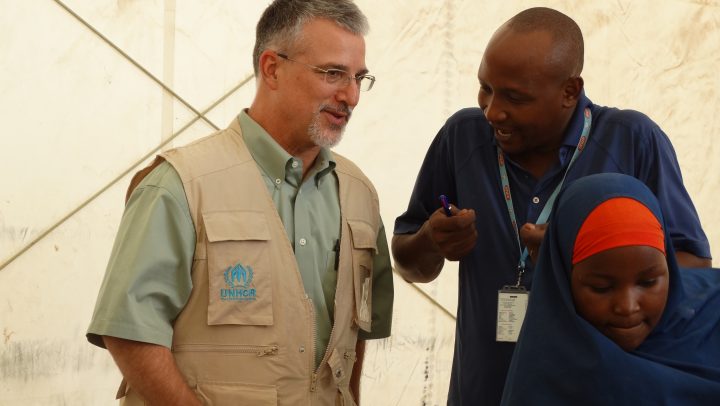We asked Doug Greene, our Chief Information Officer, everything you ever wanted to know about blockchain and how it could affect the humanitarian world and UNHCR.

© UNHCR/ Doug Greene discussing with the biometrics team in Dadaab Kenya.
What is blockchain and why is it important to UNHCR?
DG: Blockchain is an alternate computing model that promises to process transactions faster, cheaper and more securely than traditional methods. In simple words, it is a shared, distributed ledger that enables participants (i.e. people and things) to transact with each other without any central coordination.
To give you a practical example, your entire medical history could be centrally recorded and maintained in a blockchain ledger which would allow secure and traceable access by authorized hospitals and health care providers.
In the long-term, blockchain has the potential to disrupt the way business is done. And while there is tremendous hype around this blockchain right now, it is important for UNHCR to understand and harness the technology and be prepared for the potential changes.
How mature is the blockchain technology?
DG: Like with all other emerging technologies, we should proceed with caution. Many uses of blockchain technologies are not fully developed, are untested, and will require early adopters to accept significantly increased risk levels over the next five to seven years.
The business sector developing selling and supporting this new technology is not fully formed yet. Companies are jockeying for attention, including professional services firms and startups, requiring careful, multi-layered evaluation. Furthermore, this technology has so far operated outside traditional legal, accounting and institutional governance frameworks not in line with long-standing working practices.
Nonetheless, it is very important that we understand the potential application of blockchain. Launching low-cost, targeted proofs-of-concept would be very useful to gain hands-on experience and determine the business case for further exploration. However, large investments in blockchain should be avoided in the near-term given the lack of maturity of the technology.
Is blockchain secure?
DG: Blockchain itself is inherently secure as it is based on current encryption technology which is very difficult to crack. In fact, it is as secure as any other certificate encrypted technologies, which are used practically by all Internet facing systems.
The potential security issues arise in the actual use of blockchain by other systems. Think of it like the current use of credit cards for online purchases. The encrypted transaction over the Internet to a retailer’s website is quite safe; however, if someone has stolen your credit card number, the problem arises in the fraudulent attempt to purchase something. We often hear stories of how retailers have been hacked and credit card information is stolen. So it is not the Internet transaction (i.e. blockchain) that is unsecure, it is the safe storage and usage of the credit card (i.e. electronic wallet) that is at risk.
Despite these risks, we are willing to move cautiously ahead since data protection is – and should be – our priority. In the context of the High Commissioner’s policy to provide a digital identity to all of our persons of concern, blockchain technology will be deployed if it proves to be superior to existing proven alternatives.
When will we know more?
DG: Next year for sure. Just follow this blog!
Blockchain in Azraq Camp
WFP is currently piloting blockchain technology for cash distribution with 10,500 refugees living in Azraq camp in Jordan. For recipient verification, the WFP system accesses the refugees biometric data, collected by UNHCR.

How will the introduction of this technology affect the number of new job creations and job losses in UNHCR? In short, how many jobs will be sliced in comparison with how many new jobs will be created when UHNCR makes the switch to the use of this technology? Have we built sufficient internal capacity necessary to move forward with this new technology?
@Gloria Chinebuah
But, the mission of UNHCR are Refugee.
Not jobs inside its offices !!!
As mentioned by UNHCR CIO in the article, although it has great potential, UNHCR will proceed with caution as many blockchain technologies are not fully developed. For now, UNHCR will look at low-cost proofs of concept in order to gain experience with these technologies. Only then will UNHCR know if it is viable.
Buzz about Block chain is in the air. Quite an informative and contemplative content about Block chain. You have penned it in a very interesting and understanding way.
Privileged to read this informative blog on Blockchain.Commendable efforts to put on research the Blockchain.Please enlighten us with regular updates on Blockchain. Friends if you’re keen to learn more about AI you can watch this amazing tutorial on the same.
https://www.youtube.com/watch?v=GoFK7Tlvk2w
Hi,
Thank you so much for sharing such an informative write-up! The research about 3 things you need to know about blockchain is really impressive.
Thanks for sharing!!
Thanks for sharing this. All the points which are shared are very important and need to be noticed by everyone.
Really well-done article! Extremely thorough and helpful in highlighting some great blockchain Blogs.